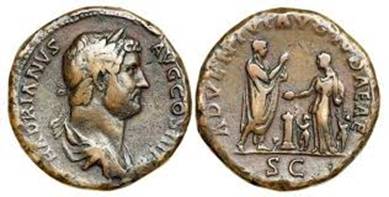At the age of 60, Hadrian returned to Rome from his travels, and began to strike coins to commemorate his visits to the empire’s provinces-- Egypt, Macedonia, Spain, etc.--and the Judaean visit was no exception. His ADVENTVI AVG IVDAEA bronze sestertius, issued some time between 134 and 138 CE, shows the Emperor receiving a Jewish woman and two children who carry palm branches; in the background, a bull appears next to a sacrificial altar. (#95) The altar was a reference to the god Jupiter Capitolinus, to whom Hadrian had dedicated his new pagan temple. Hadrian renamed Jerusalem as Aelia (his family name) Capitolina.

#95 Hadrian sestertius, c. 134-138 CE (H-1604 )
© 2020-Mel Wacks